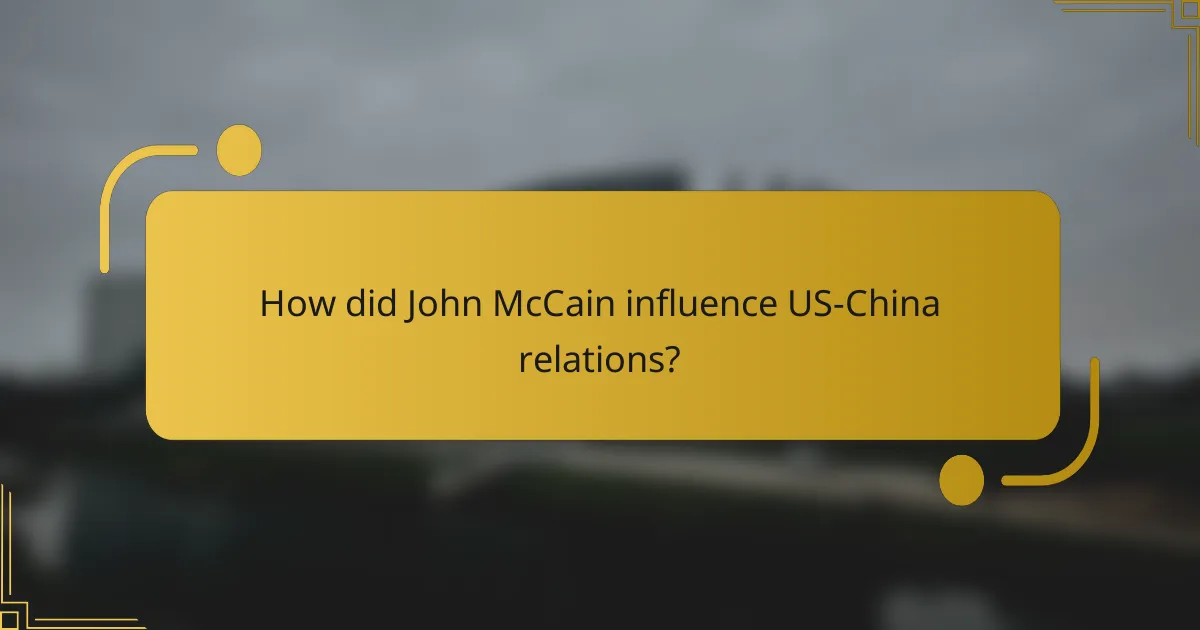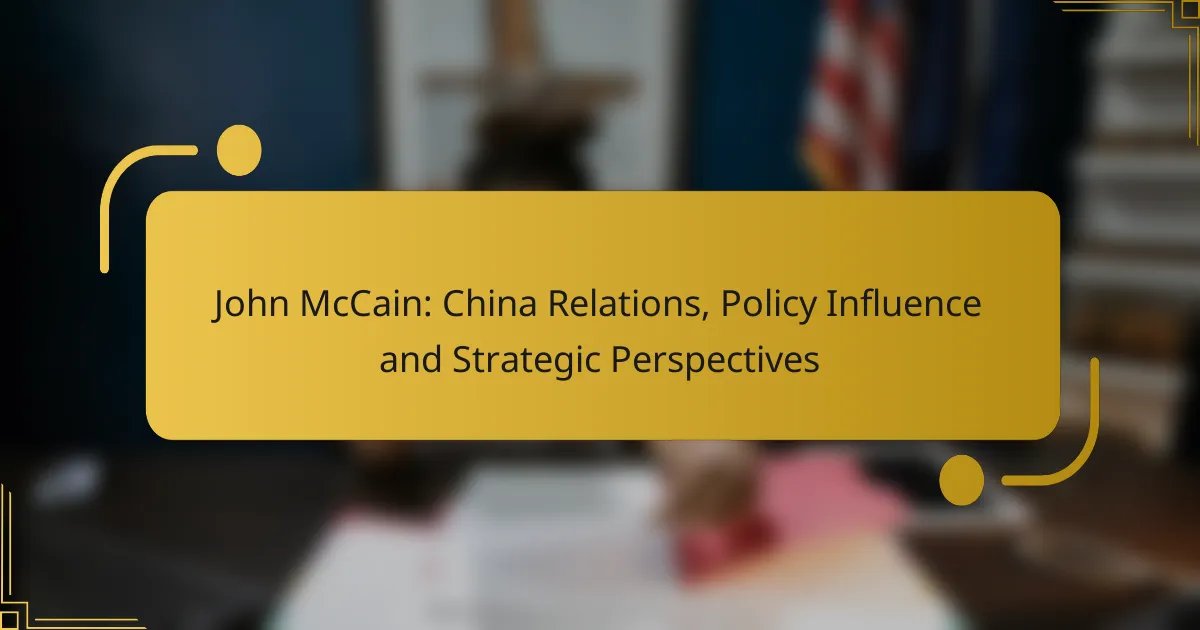John McCain played a pivotal role in shaping US-China relations by advocating for a strong stance against China’s policies and actions. He championed democratic values, supported Taiwan, and emphasized the importance of balancing economic engagement with a firm approach to national security and human rights issues.

How did John McCain influence US-China relations?
John McCain significantly influenced US-China relations through his advocacy for a robust approach to China’s policies and actions. His efforts focused on promoting democratic values, supporting Taiwan, and challenging China’s assertiveness on the global stage.
Advocacy for a strong stance against China
McCain consistently argued for a strong US response to China’s aggressive tactics in international trade and military expansion. He believed that a firm stance was essential to counteract China’s growing influence and protect US interests.
He often emphasized the importance of maintaining a balance of power in the Asia-Pacific region, advocating for increased military presence and partnerships with allies to deter Chinese expansionism.
Promotion of democratic values in China
McCain was a vocal supporter of human rights and democratic reforms in China. He frequently highlighted the need for the US to stand up for these values, arguing that engagement with China should not come at the expense of promoting freedom and democracy.
His efforts included supporting initiatives that aimed to empower civil society and encourage political reform within China, believing that a more democratic China would lead to a more stable global environment.
Support for Taiwan’s defense
McCain was a staunch advocate for Taiwan’s defense, viewing it as a critical element of US-China relations. He supported arms sales to Taiwan and called for stronger US commitments to its security, arguing that a secure Taiwan was vital for regional stability.
His position reflected a broader strategy of countering Chinese pressure on Taiwan, reinforcing the US’s commitment to its allies in the face of potential aggression from Beijing.

What policies did John McCain propose regarding China?
John McCain advocated for a multifaceted approach to China, emphasizing trade policy reforms, military cooperation with allies, and human rights initiatives. His strategies aimed to balance economic engagement with a firm stance on issues of national security and human rights.
Trade policy reforms
McCain supported trade policy reforms that encouraged fair competition and reduced barriers to U.S. exports. He believed in addressing currency manipulation and intellectual property theft, which he viewed as significant challenges in U.S.-China trade relations.
To enhance trade, McCain proposed strengthening trade agreements that included provisions for labor rights and environmental standards. This approach aimed to ensure that economic growth did not come at the expense of ethical practices.
Military cooperation with allies
McCain emphasized the importance of military cooperation with allies in the Asia-Pacific region to counterbalance China’s growing influence. He advocated for joint military exercises and enhanced defense partnerships with countries like Japan, South Korea, and Australia.
By fostering these alliances, McCain aimed to create a united front that could address security concerns in the South China Sea and promote stability in the region. This strategy included supporting arms sales to allies to bolster their defense capabilities.
Human rights initiatives
McCain was a strong proponent of human rights initiatives in China, advocating for the protection of freedoms and the promotion of democratic values. He consistently called for the U.S. government to hold China accountable for its human rights violations, including issues related to freedom of speech and religious practices.
His approach included leveraging diplomatic channels to raise awareness of human rights abuses and supporting non-governmental organizations that worked to improve conditions in China. McCain believed that a commitment to human rights should be integral to U.S. foreign policy towards China.

What were the strategic perspectives of John McCain on China?
John McCain viewed China through a lens of strategic competition, advocating for a robust approach to counter its growing influence. He emphasized the need for a multifaceted policy that included containment, economic competition, and strong alliances.
Focus on containment strategy
McCain believed that a containment strategy was essential to counterbalance China’s assertive actions in the Asia-Pacific region. This approach involved not only military readiness but also diplomatic efforts to limit China’s influence over neighboring countries.
He often argued for increased military presence in the region, suggesting that the U.S. should strengthen its naval capabilities and conduct regular joint exercises with allies. This would serve as a deterrent against potential aggression from China.
Emphasis on economic competition
McCain recognized that economic competition with China was a critical aspect of U.S. foreign policy. He advocated for policies that would promote American innovation and protect intellectual property rights to ensure a level playing field.
He supported trade agreements that would enhance U.S. economic ties with allies while countering China’s economic practices. McCain believed that fostering economic resilience at home was vital to maintaining global competitiveness.
Importance of multilateral alliances
McCain strongly emphasized the importance of multilateral alliances in addressing the challenges posed by China. He argued that a united front with allies like Japan, South Korea, and Australia would enhance collective security and diplomatic leverage.
He encouraged the U.S. to engage in forums such as the Quad and ASEAN, promoting cooperative security arrangements. McCain believed that strengthening these alliances was crucial for a coordinated response to China’s regional ambitions.

How did John McCain’s background shape his views on China?
John McCain’s background significantly influenced his perspectives on China, particularly through his military service and legislative roles. His experiences in the Navy and as a prisoner of war instilled a strong sense of national security, while his long tenure in Congress allowed him to engage deeply with U.S.-China relations.
Military service and foreign policy experience
McCain’s military service during the Vietnam War shaped his understanding of global conflicts and the importance of strong foreign policy. As a naval aviator, he witnessed firsthand the consequences of military engagement, which made him a proponent of a robust defense strategy in dealing with China.
His time as a prisoner of war further solidified his belief in the need for a principled stance against authoritarian regimes. This experience informed his views on China’s human rights record and its implications for U.S. foreign policy.
Legislative career and committee roles
Throughout his legislative career, McCain held key positions that influenced U.S.-China relations, including his role on the Senate Armed Services Committee. He advocated for policies that promoted a competitive stance against China, emphasizing the need for military readiness and strategic partnerships with allies in the Asia-Pacific region.
McCain also served on the Senate Foreign Relations Committee, where he pushed for a comprehensive approach to engage China on issues such as trade, climate change, and regional security. His bipartisan efforts aimed to balance cooperation with necessary confrontation.
Personal connections with Chinese leaders
McCain developed personal relationships with several Chinese leaders, which provided him with unique insights into China’s political landscape. These connections allowed him to advocate for dialogue while remaining critical of China’s policies, particularly regarding human rights and trade practices.
His interactions with Chinese officials often emphasized the importance of mutual respect and understanding, yet he consistently highlighted the need for the U.S. to stand firm on its values. This dual approach reflected his belief in engaging with adversaries while maintaining a strong national stance.

What lessons can be learned from John McCain’s approach to China?
John McCain’s approach to China emphasizes the importance of a strong, principled stance combined with diplomatic engagement. His strategies highlight the need for a balance between addressing human rights issues and fostering economic cooperation.
Importance of bipartisan support
Bipartisan support is crucial for a coherent and effective U.S. policy towards China. McCain advocated for collaboration across party lines to ensure that strategies addressing trade, security, and human rights are consistent and robust.
For example, when both Democrats and Republicans unite on key issues like trade tariffs or military presence in Asia, it sends a strong signal to China about U.S. resolve. This unity can help mitigate the risks of policy reversals with changing administrations.
Need for a comprehensive strategy
A comprehensive strategy towards China involves integrating economic, military, and diplomatic elements. McCain believed that the U.S. must not only compete economically but also engage diplomatically to address global challenges collaboratively.
This strategy should include clear objectives, such as promoting fair trade practices and addressing regional security concerns. For instance, establishing trade agreements that prioritize American interests while encouraging compliance with international norms can enhance U.S. leverage.



